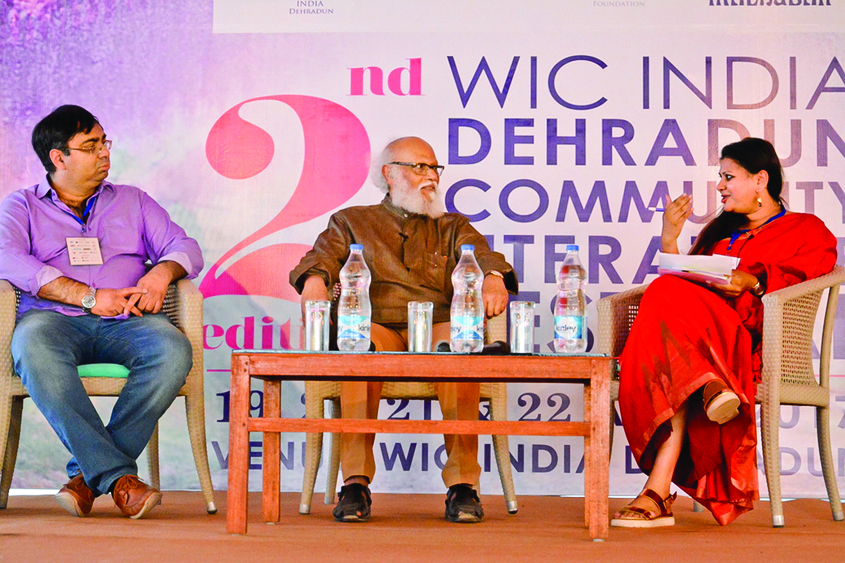The festival, which is the only such literary forum in the region, was held at the World Integrity Center (WIC) India, and was organised jointly by the WIC along with the World Integrity Foundation, the Madhuban Group and the Harvard Club of India.
The first day of the festival began with a session on “Essential Art: Essential Poetry”, presented by Jatin Das and Rohinton Daruwala. Das is a veteran contemporary artist who has been painting for some 50 years and has held over 55 solo exhibitions both in India and abroad, while Rohinton Daruwala is the author of the book , The Sand Libraries of Timbuktu. The session was moderated by WIC India president Nazia Yusuf Izuddin.
At the opening session, Das said, “We are not performing artistes. We work quietly. It is not necessary for an artist to exhibit. These days, artists not only work, but they themselves are in the marketplace. For any creative activity, you need distance from public money and power.”
Talking about paintings and the dangers of historicising art, Das said to Guardian 20, “Paintings are not a documentation of history. Why should a painting tell the world the history of an art, and of a nation? It is not an illustration. These are all personal things and it is a wrong notion that it should depict some version of our history. Creative expressions are individual expressions — be it painting, music or poetry.”
The artist also talked about traditional art. He said, “I don’t look at art as traditional art or modern art. I simply look at it as art. As an artist, I am interested in everything in life — like nature, people, traditions, cultures.”
The very next session on day one featured popular actress Sonali Bendre Behl, who talked about parenting techniques in this day and age. Drawing on the stories presented in her book, The Modern Gurukul: My Experiments with Parenting, the actor shared the details of her journey as a mother, hinting at how challenging motherhood can be. In a conversation with Milee Ashwarya, an editor at Penguin Random House, the actress said, “I have written my own experiences on parenting in this book. My 11-year-old son has been my source of inspiration.”
“What we today consider as Western and subversive actually existed in India thousands of years ago. These things were part of the culture of those days. We must remember where we came from.”
She also shared certain insights on parenting. “It is very difficult to raise your child in the digital age,” the actress said. “But you have to understand your child’s psychology and you have to be patient enough to answer their queries. While the child is growing up, you are also learning as a person, which is a positive experience altogether.” The first day of the fest concluded with a mesmerising performance by EKA, a Delhi-based rock band.
The festival’s second day started with an interesting session on “Female Sexuality in Indian Literature”, which included a discussion between authors Ira Mukhoty and A.N.D Haksar. Mukhoty has written for various magazines on culture and travel and recently wrote a book titled Heroines: Powerful Indian Women of Myth and History, which was one of the topics touched upon at the event. Haksar is a well-known translator of Sanskrit classics into English.
Commenting on Indian history and culture and the subversive strain running across these spheres, Mukhoty said, “What we today consider as Western and subversive actually existed in India thousands of years ago. These things were part of the culture of those days. We must remember where we came from.”
Mukhoty, who has written books centred on the female perspective, believes that Indian history and mythology is full of women — like Draupadi, Amrapali — who fought against patriarchal notions and confronted gender-bias with great courage. The author talked about her book which deals with the life of eight great women from India, both mythological and historical past of this country — an attempt to understand the real nature of female courage in the past and present.

This was followed by a session on “Sacred History; Sacred Mythology: Controversies in History and Myths of India”, moderated by Mitali Mukherjee, with authors Roshen Dalal, Nayantara Sehgal and Kavita Kane on the panel.
The four-day festival ended with felicitation of the associates, and gala music and festivity. Talking about the event, Nazia Y Izuddin, WIC India president said, “We are glad that with the second edition of the Dehradun Community Literature festival showed our love for Dehradun as well as our love for literature. Literature like culture is diverse and heterogeneous. It is vivid and overlaps over various topics and themes of life. We have therefore paid attention in touching a whole range of topics and themes from popular fiction to history, mythology and even parenting. We hope that this will go a long way to establish Dehradun as a leader and key agent of change in leading the modern literary world.”

